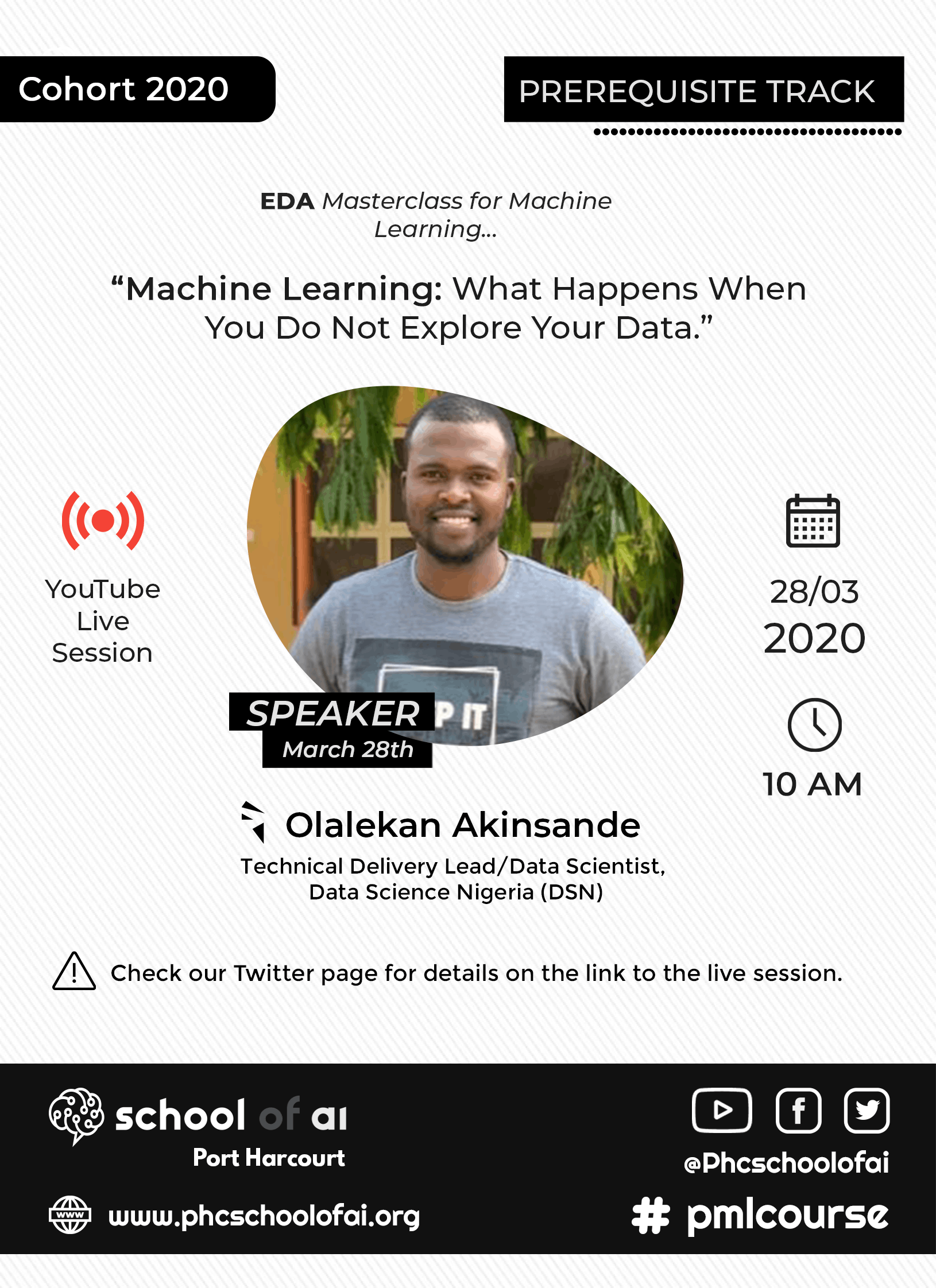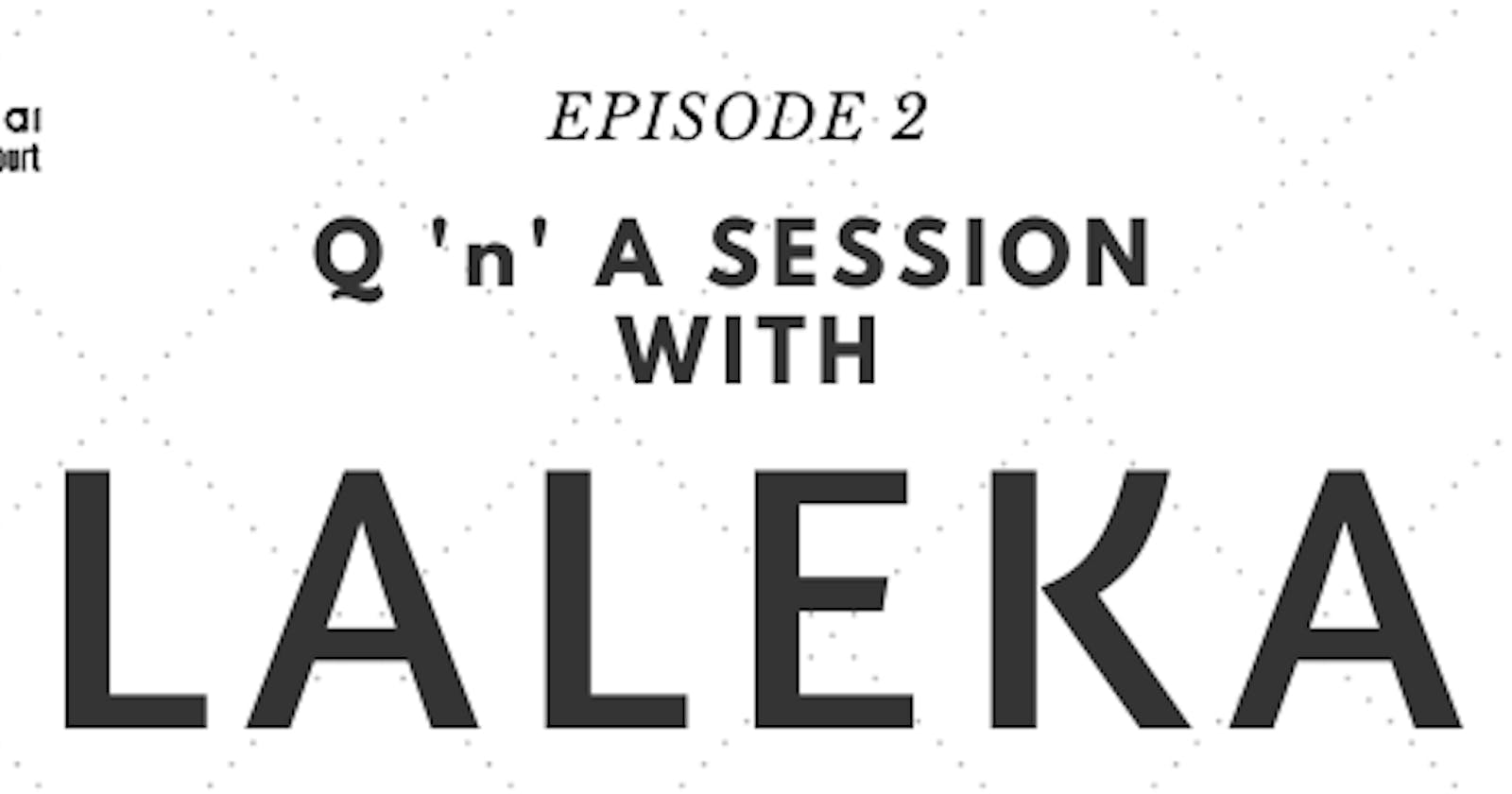Insights In AI and Data Science (Episode 2): Q and A with Olalekan Akinsande, Technical Delivery Lead & Data Scientist at Data Science Nigeria (DSN)

Hello, community!
We are back to our "Q 'n' A With Our Experts" blog post series. You can check the previous blog post in this series on Design Thinking by clicking here.
In this episode, we had an interview with this week’s guest facilitator for the Practical Machine Learning course. This interview is intended to give an insight into the expert mind of Olalekan Akinsande who is a technical delivery lead and data scientist at Data Science Nigeria (DSN). We try to make sure the participants of the course get inside the mind of their guest facilitator through these interviews and as well as the general community. Enjoy!
This week’s interview session was conducted by Stephen Oladele who is the lead volunteer for the Port Harcourt School of AI community.
There are 3 categories of questions. If you want to jump through to a category quickly, you can click on any one of the categories below.
Questions on his EDA expertise
Personal questions
Stephen: Hi, Olalekan! Thanks for doing this Q ’n’ A session with us — we are honoured. Please can you introduce yourself?
Olalekan: My name is 'Lekan Akinsande. I am a Data Scientist and I lead technical delivery at Data Science Nigeria.
Stephen: Awesome. Being the lead for technical delivery at a high-impact non-profit like DSN surely brings with it a lot of prestige. How did you get into your current field?
Olalekan: I started my analytics journey in 2013; then I started with the Statistical Package for Social Sciences (SPSS) for analyzing behavioural research data. Shortly after my undergraduate studies at the department of psychology, Obafemi Awolowo University, Ile-Ife, I got a job as a Business Analyst at a Software Company in Lagos, Nigeria. While at the company, I developed my advance analytics skills by working with real business and operations data. Thereafter, I joined the Data & Analytics team at KPMG where I had the privilege to execute various analytics and automation projects across different industries.
Stephen: That speaks a lot of enterprise experience, and we are very glad to have you here. What did you want to be when you went to university? What did you end up studying? And how did what you studied impact how you currently work
Olalekan: My first choice of study was Law and second was Political Science. However, as God would have it, I ended up studying Psychology at Obafemi Awolowo University. Thank God I studied psychology! I might have never come across data analytics when I did. In my current work, I apply the principles of psychology to manage myself and my relationship with others.
Stephen: Ah yes, of course judging from your expression and the journey so far, that's surely a blessing in retrospect. Great! Thanks for answering those under the “personal questions” session. I will now move to ask you some couple of questions on your exploratory data analysis (EDA) expertise.
Exploratory Data Analysis (EDA) Questions
Stephen: Pretend I’m new to the field of data science and data analysis. Can you explain what EDA is and why is necessary for me?
Olalekan: Simply put, EDA is all about getting to know your data. It refers to the process of performing initial investigations on data so as to discover patterns, to spot anomalies, to test hypothesis and to check assumptions with the help of summary statistics and graphical representations. EDA is necessary because it helps you gauge every nuance from the data at an early encounter.
Stephen: Your simplification is quite apt. I am a data scientist and I know first-hand how much EDA can be very effective for projects. Thanks for that.
What is one thing about EDA that is clear to you but is not so to other people?
Olalekan: EDA is different from Data Mining. In EDA, you typically explore and compare many different variables with a variety of techniques to search and find systematic patterns. Data mining, on the other hand, is concerned with extracting patterns from the data. Data Mining can be said to be more application-oriented, while EDA is concerned with the basic nature of the underlying phenomena. In other words, Data Mining is relatively less concerned with identifying the specific relations between the involved variables.
Stephen: Thanks for this insight, this is definitely one that can confuse beginners in the data science field.
Speaking of beginners, this question will be an important one for them; how did you become such an expert on EDA?
Olalekan: Simply put, I became an expert on EDA by doing Exploratory Data Analysis.
Stephen: Hahaha, such puns can be forgiven because they are quite necessary to make a point. You heard that right. Want to become an expert like Mr Olalekan? Go do stuff! 😁
Thanks. Off the back of the last question, how much Maths and Stats do you think one needs to know to be proficient at EDA?
Olalekan: Basic Maths and Stats. EDA usually involves a good understanding of the measure of central tendencies i.e mean, median and mode.
Stephen: Absolutely! Digging into the previous question further for specifics, what are the necessary skills to learn to become proficient at EDA?
Olalekan: Learn some basic data visualisation such as the use of histogram, boxplot, barplot, heatmap, and add some basic statistics to your skills.
Stephen: In your opinion, how does EDA and feature engineering differ?
Olalekan: EDA can show us hidden relationships and attributes present in our data even before we throw it at a machine learning model. On the other hands, Feature Engineering is simply using your existing knowledge of the dataset to create new features that can help a machine learning model perform better.
Stephen: Hmm.. So this says EDA your data before feature engineering it, folks!
What are your favourite EDA tools?
Olalekan: My favourite EDA tool is Python (Pandas, Matplotlib and Seaborn). I also use non-programming tools like MS Excel, Orange3 and PowerBI.
Stephen: Great tools! This begs the next, million-dollar question: Python or R?
Olalekan: Truth is both programming languages are good for Data Science. I am a Pythonista but I am currently learning some R.
Stephen: Thanks a lot Mr Olalekan for taking time off your busy schedule to answer our questions. Before you go, there’d be one last section; your advice to the audience. This is pretty much anyone who is perhaps looking for ways to learn the skill of design thinking, or just needs direct advice from you.
Advice to the Reader
Stephen: What are your best resources for people looking to learn EDA?
Olalekan: There are a lot of articles on medium.com, kaggle.com and analyticsvidhya.com.
Stephen: If you would ever give only one advice to anyone looking to learn EDA, what would that be?
Olalekan: When I started coding in Python, I struggled. Sometimes a lot more than one can ever think! Because I had never ever coded even Hello World in my entire life. Now when I look back, I laugh at myself because I could have chosen one of several non-coding tools available for data exploration and could’ve avoided the suffering. My simple advice is, you don't have to box yourself to doing EDA with just Python or R, you can consider learning and doing EDA even with Non-programming tools like PowerBI, Tableau, Orange3 and even MS Excel.
Stephen: Absolutely! Thank you for your invaluable insights. It means a lot to us and hopefully the community. We hope you have a great time during your live session with us.
Thank you for taking the time to enjoy this interesting interview with Mr Olalekan. He showed how willing he is to share his knowledge with the community with his non-hesitant response when we reached out to him for this cause. We will hopefully keep releasing sessions like these before each of the classes with a guest speaker/facilitator. If you would like to ask Mr Olalekan a question directly, feel free to reach him on Twitter @Akinsande1.
If you enjoyed it the Q and A with Mr Olalekan, do leave a reaction for the story, hit the like button, and share it with your friends that may be interested. See you soon.

